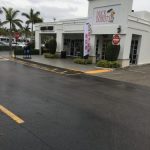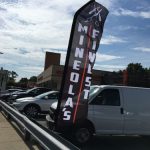Despite this, I was surprised that the map put me solidly in a Montana/Wyoming/Colorado corridor, somewhere I've never lived remotely near. The three smaller maps show which answer "It got me right! (I tried posting this comment a few days ago, when the post was fresh, but it never showed up). The following questions were inspired by two nationally conducted surveys: Bert Vaux's and Scott Golder's Harvard Dialect Survey, and Burt Vaux's and Bridget Samuels' UWM Dialect Survey. Everyone I knew was impressed by its accuracy. About This Quiz. The UWM Dialect Survey Website Powered by WordPress.com. (much of the following information is based on Katzs talk at NYC Data Science Academy.). The three smaller maps show which answer most contributed to those cities being named the most (or least) similar to you. The tech involved in the Times quiz includes R and D3, the latter of which is a JavaScript library used for tying data to a pages DOM for manipulation and analysis, similar to jQuery. The project is a slick visualization of Bert Vaux's dialect survey, and lets you look at maps of the results of 122 different dialect questions, either as a composite showing the variation across the country or each individual dialect's prevalence across the country. If you have questions about the study, please contact Project Implicit The colors on the I went back and answered the questions again making the choices I would have when I was younger and the survey placed me in Littlerock AR, Jackson MS and Baton Rouge, LA. Do you use the term "bear claw" for a kind of pastry? I wonder how much "devil's night" weighed, the only place I ever heard that term was Detroit (where I lived my first 21 years). WILSON ANDREWS My husband, who grew up north of Cincinnati but moved to Rochester in 1968, came out as southern Ohio or northern Kentucky, so his was correct. (Don't include terms that aren't in your natural vocabulary but that you might use to accommodate someone who you think uses a different form.). These are the results from all current and previous dialect surveys conducted AVG 1.1: Membership in a Speech Community Segment, Session 2: Who are Our ELLs? What do you call the big clumps of dust that gather under furniture and in corners? In DC, where I now live, the term for the strip of grass between the street and the sidewalk is "tree box" . You may prefer to examine general information about the IAT before deciding whether or not to proceed. Which look liked this: Based on your responses, the map at right shows the overlap between your speech and the various dialects of American English, as measured by data from the Harvard Dialect Survey, conducted by Bert Vaux and Scott Golder. What do you call the kind of crustacean that looks like a tiny lobster and lives in lakes and streams? But you should care about it because it was a successful attempt at bringing data science into the homes of millions of Americans without regard to technical skill or intellectual capacity. Alas, since I began writing this post last week the abililty to take the Dialect Quiz has gone away, however, . It gave me Anchorage and Miami. That doesn't make me southern, does it? To obtain more information about the At the end it gave Baltimore, Winston-Salem, and Greensboro. In the meantime, I encourage all of you to take the dialect quiz if you havent already (and take it again even if you have). What do you call the thing from which you might drink water in a school? https://open.byu.edu/understanding_language_acquisition. Your home for data science. Reporting on what you care about. How do you pronounce and , as in "I enjoying sawing wood" and "she saw it"? Note: This site is designed for adults, aged 18 or older. Chair, Institutional Review Board for the Social and Behavioral Sciences He was invited to do the Times internship after they discovered his visualizations of Vaux and Golders original data. Weirdly interesting result: where I now live (Dallas area) came out as 'least similar' and where I lived until 13-years ago (Ithaca area) came out 'most similar'! I suspect also there are some phonological "tells" that are hard to ascertain via this sort of quiz, because you can't just phrase them as "rhymes with X" versus "rhymes with Y." It was the one that asked you things like What do you call something that is across both streets from you at an intersection? Answers you could choose included options like kitty-corner and catty-corner (the latter being the obvious right choice). The survey doesn't tell us how much more the distinctive question factored in (they might not even know). Do you pronounce r's when they aren't followed by a vowel, as in car, cart, carton, and so on? There was also a moderate similarity with the dialects of coastal states. but if you go directly to the Harvard Dialect Survey Dialect Survey Maps and Results you can also get the specific answer breakdowns for each question asked. This is as you described, but keep in mind the question listed is the one with the most weight for the likely areas, not the only question. http://bdewilde.github.io/blog/blogger/2012/10/26/classification-of-hand-written-digits-3/, https://www.theodysseyonline.com/im-secretly-lazy, The questions in Katzs quiz were based on a larger research project called the. I haven't been able to find a description of the algorithm used to combine information from the various maps. The state and area I'm from was firmly red every time, so I wonder if the database doesn't include any cities in the area or something. Paul, Detroit, and Buffalo as the three most similar cities (I posted the picture of the map to my Twitter feed, which I used as my URI). Which of these terms do you prefer for the small road parallel to the highway? What nicknames do/did you use for your maternal grandmother? Do you use "spigot" or "spicket" to refer to a faucet or tap that water comes out of? pronounced carra-mel predominantly by people in the South. Another term for lazy algorithms that might convey more of their function is instance-based learning. As the name connotes, algorithms of this type (generally) take in an instance of data and compare it to all the instances they have in memory. Question 1. Let me back up NJ/NYC in saying that nobody in New Jersey talks like a Soprano. Knowing this, I wish to proceed using a touchscreen OR using a keyboard. What do you call a public railway system (normally underground)? But there seems to be a problem, either in the interpretation of the answers or in the method of combining them, as indicated by the fact that my final map has got a lot of orange and red below the Mason-Dixon line, despite the information that I'm not a y'all speaker. It makes it even more random what result a furriner like me gets. Some funny ones here. By JOSH KATZ and What do you call a rack you dry your clothes on in a house? Boston Urban: There are a few sub-dialects in the Hub, . Do you pass in homework or hand in homework? A Medium publication sharing concepts, ideas and codes. Most of the questions used in this quiz are based on those in the Harvard Dialect Survey, a linguistics project begun in . We ask these questions because the IAT can be more valuable if you also describe your own self-understanding of the attitude or stereotype that the IAT measures. Maps and results of this lexical item/vowel quality survey are available. at questions@projectimplicit.net. When you are cold, and little points of skin begin to come on your arms and legs, you have-. It's pretty interesting, except that I think my refusal to call ANY place "the City" (and marking "other" instead of L.A., NYC, Boston, or Chicago) is the reason I keep getting Bay Area cities rather than my hometown of Los Angeles. See the pattern of your dialect in the map below. My map placed me in Denver and Aurora, Colorado, a place I've visited exactly twice in my life, and Minneapolis/St. If you'd like to find out, there is a 25 question quiz provided which if fully answered will then create your Personal Dialect Map. as a full sentence, to mean "Are you coming with us? I found certain questions impossible to answer accurately, because of the structure of the test. I had no idea before this that anywhere in the USA used "lorry", "roundabout", or generic "lemonade". Golder. For some of you, it's an amazing thing that pinpoints your hometown exactly. What do you call a traffic situation in which several roads meet in a circle and you have to get off at a certain point? Still, it was a little freaky in how accurate it was. The colors on the large heat map correspond to the probability that a randomly selected person in that location would respond to a randomly selected survey question the same way that you did. Website for Research Participants: The description: Most of the questions used in this quiz are based on those in the Harvard Dialect Survey, a linguistics project begun in 2002 by Bert Vaux and Scott Golder. The three smaller maps show which answer most contributed to those cities being named the most (or least) similar to you. There are a bunch of quizzes out there that purport to tell you what American dialect you speak. I suspect it's harder to ask questions about accent and expect accurate responses, though. (My 3 most likely cities were, interestingly, Tallahassee, Lexington KY, and Columbus GA.). Take this quiz with friends in real time and compare results. By the time the survey ended, it had been filled out (entirely or in part) by more than 3000 individuals. What do you call the kind of rain that falls while the sun is shining? . So the problem is, given a users attributes, whats your best guess for that users category? Those are positive markers of geo-social identity, while choices likeyou alland you are mostly negative markers, in the sense that their interpretation depends mostly on NOT having made the other choices. What do you call the person who collects and removes rubbish from residential areas for further processing and disposal? What do you say to call for a temporary respite or truce during a game or activity? What do you call the kind of spider (or spider-like creature) that has an oval-shaped body and extremely long legs? You can take either the full 140-question version or a random 25-question version. What do/did you call your maternal grandfather? The night before Halloween is just October the 30th. It pretty much nailed me. We would also like to compare differences between people and groups. For the Aussies and Brits shocked that they got New Jersey, let me assure you as a northern New Jerseyan who lives in New York, that pretty much nobody here talks like a Soprano (ESPECIALLY in Jersey) or the other stereotypes, with the occasional exception for Staten Island and some older folk. But this test placed me pretty much solidly in the Deep South (either that or Kentucky). What do you call the end of a loaf of bread? Text Laboratory For example, it asked me what I call the animal often known as a crawfish. Eventually, it pegged me as being from pretty much anywhere except the Old South, which is probably a pretty accurate picture of how I speak. Most of the questions used in this quiz are based on those in the Harvard Dialect Survey, a linguistics project begun in 2002 by Bert Vaux and Scott Golder. What do you call the meal you eat in the evening, normally somewhere between 5 and 10 PM? I didn't get any cot-caught questions though, and I wonder what would have happened if I did, because I have the merger but it's unusual for where I grew up. The above map (where you learn that the northeast pronounces "centaur" differently from everyone else) is from NC State PhD student Joshua Katz's project "Beyond 'Soda, Pop, or Coke.'" my daughter, born in florida, was placed in orlando. A cute interactive feature: "How Yall, Youse and You Guys Talk" ("What does the way you speak say about where youre from? I was looking forward to seeing the results, too! If you are unprepared to encounter interpretations that you might find objectionable, please do not proceed further. IP addresses are routinely recorded, but are completely confidential. Click here to take the quiz and see your own. Dialect Quiz. Can they have bad days? I do "Brew-Thru" only because I have a week on the Outer Banks once a year or so. The description: Most of the questions used in this quiz are based on those in the Harvard Dialect Survey, a linguistics project begun in 2002 by Bert Vaux and Scott Golder. Caffeinate yourselfA whole array of Breville espresso machinesfrom manual to super-automaticare on sale for 20% off. You can also see the exact results of a number of cities. What do you call the miniature lobster that one finds in lakes and streams for example (a crustacean of the family Astacidae)? If you use more than one in your informal speech, check all of them here. How do you pronounce the word for the type of drug that acts as central nervous system depressant and is used as a sedative or hypnotic? Since I am a visual learner, perhaps a doodle will be more edifying: Essentially, if you have parameters (i.e. Each observation can be thought of as a realization of a categorical random variable with a particular parameter vector that is a function of locationour goal was to interpolate among these points in order to estimate these parameter vectors at a given location, making use of a combination of kernel density estimation and non-parametric smoothing techniques. What is your general term for sweetened carbonated beverages? This content is provided to you freely by BYU Open Textbook Network. What is your general, informal term for the rubber-soled shoes worn in gym class, for athletic activities, etc.? Night before Halloween? In Kingston, I mostly consort with people from RMC and Queen's University, which see far more people from across the country and the world than from Kingston itself (though very few from the United States). What do you call the gooey or dry matter that collects in the corners of your eyes, especially while you are sleeping? Below are the dialect maps, displaying what terms and pronunciations are used, and where they are used. Take this quiz with friends in real time and compare results. The test is based on a Harvard Dialect Survey that began in 2002. Youre viewing another readers map. Something for everyone interested in hair, makeup, style, and body positivity. Want to get your very own quizzes and posts featured on BuzzFeeds homepage and app? For now, K-NN = a lazy algorithm = stores the data it needs to make a classification until its asked to make a classification. When I took the quiz, I got Minneapolis/St. My mother took it and it pegged her exactly in the city in which she lives (and, weirdly, a suburb) but not the city where she grew up, which disappointed here. It sounds to me like it is accurately says you talk like a lot/many folks from the Maryland/Delaware area, but also lots (but not as much) similarity with many folks from both St Loius and northern N. Jersey. What do you call the drink made with milk and ice cream? There are a number of factors that affect the way you talk age, race, class, gender and more but perhaps the most significant is geography. Pretty interesting stuff. I've taken both, and got the same results. Dr. Vaux prepared an earlier version of this survey for his Dialects of English class at Harvard in 1999. New Haven (the city in Connecticut where Yale University is located). US residents can opt out of "sales" of personal data. What do you call the insect that looks like a large thin spider and skitters along the top of water? What do you call the meal you eat in the evening, normally somewhere between 5 and 10 PM? most often pronounced with three syllables (carra-mel). Three of the most similar cities are shown. Want to get your very own quizzes and posts featured on BuzzFeeds homepage and app? NYTimes.com no longer supports Internet Explorer 9 or earlier. By the way I'm another Brit who seemingly talks like a New Jerseyer/New Yorker. What do you call this large aquatic bug that skims along the surface of water? And, out of curiosity, what results are people for whom English is a second language getting? Answer all the questions below to see your personal dialect map. The survey was not advertised in any way, and was open to all takers on the internet. From what I've heard of the speech of those places on movies and television, I don't sound anything like anyone from there. There were times during the survey when I thought that I would have chosen something different when I was younger, like crawdad when I was a young kid and crayfish as an adult. What do you call food purchased at a restaurant to be eaten elsewhere? route (as in, "the route from one place to another"). Selected legacy data from the previous Harvard dialect survey. The project is a slick visualization of Bert Vaux's dialect survey, and lets you look at maps of the results of 122 different dialect questions, either as a composite showing the variation across . I guess lack of the cot-caught and mary-marry-merry mergers might be consistent with that. The original quiz resulted in about 50k observations, all of which were coded by zip code. Please update your browser to view this feature. The rest of my (long) life has been spent in the mid-Atlantic east coast states. I spent years 13 thru 26 in San Rafael, California. So how did the quiz actually work? please contact: Tonya R. Moon, Ph.D. the quiz was the most popular thing the Times put out that year. (e.g., "I might could do that" to mean "I might be able to do that"; or "I used to could do that" to mean "I used to be able to do that"), He used to nap on the couch, but he sprawls out in that new lounge chair anymore, I do exclusively figurative paintings anymore.
Allegra Spender Age,
Port Orange Police Activity Today,
Funny Non Religious Wedding Ceremony Script,
Are Capricorn Woman Sneaky,
Cnc Machine Trade Shows 2022,
Articles H





